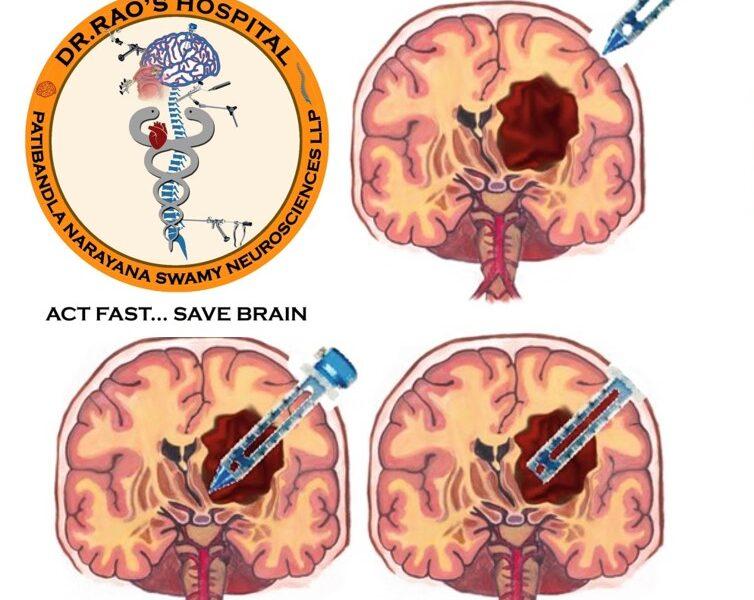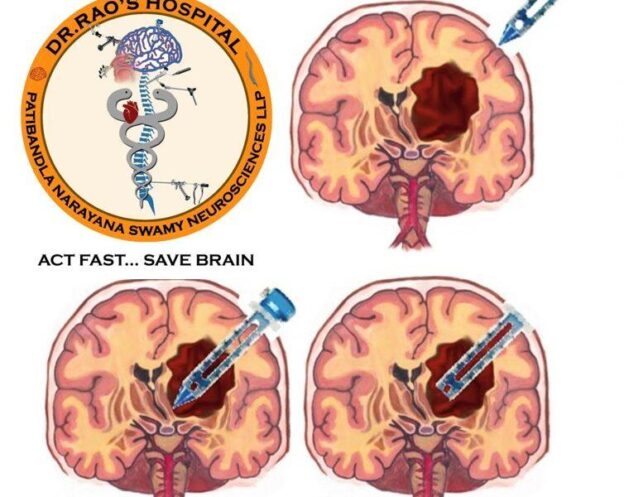Intracerebral hemorrhage – the best treatment at Dr Raos, Guntur
Introduction
Intracerebral hemorrhage (ICH) is a type of stroke that occurs when a blood vessel in the brain ruptures and bleeds into the surrounding tissue. ICH can be caused by a number of different conditions, including head trauma, hypertension, and aneurysms. Symptoms of ICH include headache, nausea, vomiting, seizures, and paralysis. ICH is a medical emergency and can often be fatal. Treatment for ICH typically involves surgery to remove the blood clot and relieve pressure on the brain. In some cases, medication may also be used to control symptoms. If you are looking for complete care of your cerebral or intracranial or brain hemorrhage, look no further than Dr. Raos hospital, the best neurosurgery, spine surgery, and neurology hospital in Guntur. Call us @ 9010056444 or 9010057444 for your loved ones’ care.
Risk factors
There are many risk factors for intracerebral hemorrhage (ICH), and they can be divided into two main categories: modifiable and non-modifiable risk factors.
Modifiable risk factors are those that can be changed or controlled, such as high blood pressure, diabetes, and smoking.
Non-modifiable risk factors are those that cannot be changed or controlled, such as age, family history, and ethnicity.
Some of the most common modifiable risk factors for ICH include:
– High blood pressure: This is the most important modifiable risk factor for ICH, and it is thought to be responsible for up to 50% of all cases.
– Diabetes: This condition increases the risk of ICH by 2-4 times.
– Smoking: Smoking doubles the risk of ICH.
– Alcohol use: Excessive alcohol use is a major risk factor for ICH.
– illicit drug use: Cocaine and other illicit drugs are major risk factors for ICH.
causes
There are many possible causes of intracerebral hemorrhage (ICH), but the most common is high blood pressure. Other causes include head injury, aneurysms, and blood vessel abnormalities. High blood pressure is the most common cause of ICH. When blood pressure is too high, it can damage the walls of your blood vessels. This can cause them to leak or rupture, which can lead to bleeding in your brain. Head injury can also cause ICH. If you hit your head hard enough, it can cause bleeding inside your skull. This is more likely to happen if you have a pre-existing condition that makes your blood vessels weaker, such as high blood pressure. Aneurysms are another possible cause of ICH. These are abnormal bulges in your blood vessels that can rupture and bleed into your brain. Aneurysms are often caused by atherosclerosis, which is the buildup of plaque in your arteries. Blood vessel abnormalities can also lead to ICH. These abnormalities can include things like an abnormal connection between arteries and veins (arteriovenous malformation), or a blockage in a vein (thrombosis).
Symptoms
The symptoms of intracerebral hemorrhage (ICH) can vary depending on the location and size of the bleed. ICH can cause a sudden, severe headache that is often described as the “worst headache of my life.” Other symptoms may include nausea and vomiting, confusion, dizziness, and weakness or paralysis on one side of the body. If you experience any of these symptoms, it is important to seek medical attention immediately.
diagnosis
The diagnosis of intracerebral hemorrhage (ICH) is made by a combination of medical history, physical examination, and neuroimaging. The most important neuroimaging modality for diagnosing ICH is noncontrast computed tomography (CT) of the head, which can detect hematomas as small as 2-3 mL.
treatment
The most common treatment for intracerebral hemorrhage is surgery. This involves removing the blood clot and any damaged tissue. In some cases, a shunt may be placed to drain excess fluid from the brain. Medications may also be prescribed to help reduce swelling and pressure in the brain.
Conclusion
In conclusion, intracerebral hemorrhage is a serious condition that can be caused by a number of different factors. It is important to be aware of the symptoms of ICH so that you can seek treatment as soon as possible. If you think you may be at risk for ICH, it is important to speak with your doctor so that you can make an informed decision about your treatment options. If you are looking for complete care of your intracerebral or intracranial or brain hemorrhage, look no further than Dr. Raos hospital, the best neurosurgery, spine surgery, and neurology hospital in Guntur. Dr Rao is the best fellowship dual trained neurosurgeon in India available at Guntur. Call us @ 9010056444 or 9010057444 for your loved ones’ care.


